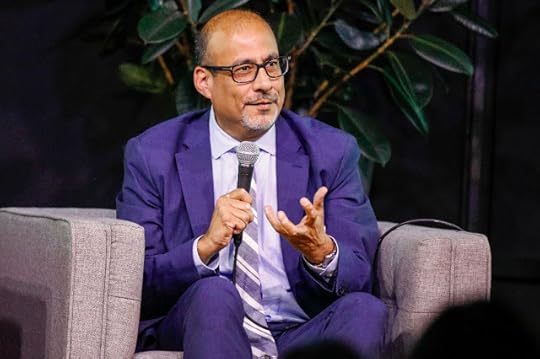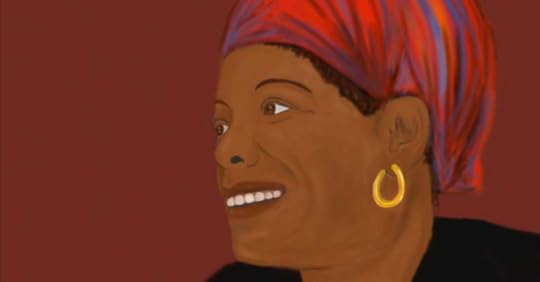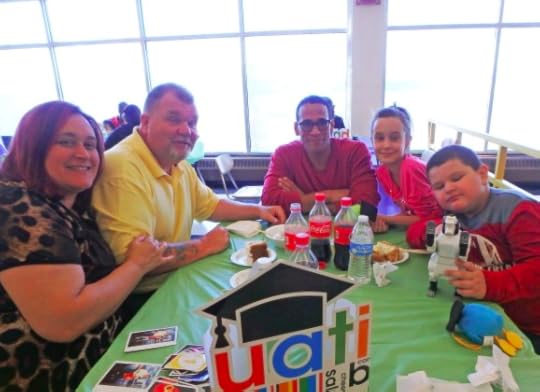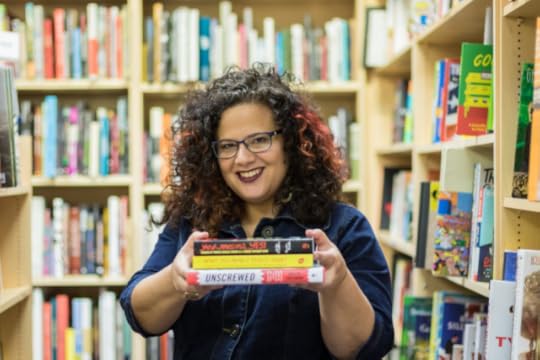Mark Anthony Neal's Blog, page 481
December 22, 2017
The Public University: Abel Valenzuela on Public Responsibility, Labor, and Organizing
 'On location at UCLA, Professor Abel Valenzuela joins the
New Dawn Podcast
to talk about the role of labor, organizing, and the public university more broadly during the current presidential administration.'
'On location at UCLA, Professor Abel Valenzuela joins the
New Dawn Podcast
to talk about the role of labor, organizing, and the public university more broadly during the current presidential administration.'
Published on December 22, 2017 05:25
Revolutionary Writers – The Poet: Dr. Maya Angelou
 'The venerable poet, writer, activist, dancer and singer Dr. Maya Angelou teaches that above all else, we are more alike than we are unalike. In the season 2 finale of the
PBS | American Masters
podcast Revolutionary Writers episode, listen to Dr. Angelou share insights into her life as a teacher, what it takes to be courageous and an emotional story from her time in Ghana visiting a wharf where slaves were once sold and traded.'
'The venerable poet, writer, activist, dancer and singer Dr. Maya Angelou teaches that above all else, we are more alike than we are unalike. In the season 2 finale of the
PBS | American Masters
podcast Revolutionary Writers episode, listen to Dr. Angelou share insights into her life as a teacher, what it takes to be courageous and an emotional story from her time in Ghana visiting a wharf where slaves were once sold and traded.'
Published on December 22, 2017 05:18
Making Contact: Parenting From Prison, Inside Out
 'When one or both parents are in prison the whole family is, in a way, also imprisoned. Family members are negatively affected in ways that worsen existing struggles and inequities.
Making Contact
goes to New York and New Hampshire to hear about programs for inmates and families that encourage rebuilding and maintaining relationships -- despite being separated by prison. The Storybook program in at the State Prison for Men in Concord, New Hampshire is different than at other prisons across the country. It's run by the Department of Corrections (DOC), instead of a nonprofit or grassroots organization that can function as a link between the men inside and their communities outside. Our non-narrated piece shares some of the changes that these fathers experience, but also some of the stories and messages they read to their children.'
'When one or both parents are in prison the whole family is, in a way, also imprisoned. Family members are negatively affected in ways that worsen existing struggles and inequities.
Making Contact
goes to New York and New Hampshire to hear about programs for inmates and families that encourage rebuilding and maintaining relationships -- despite being separated by prison. The Storybook program in at the State Prison for Men in Concord, New Hampshire is different than at other prisons across the country. It's run by the Department of Corrections (DOC), instead of a nonprofit or grassroots organization that can function as a link between the men inside and their communities outside. Our non-narrated piece shares some of the changes that these fathers experience, but also some of the stories and messages they read to their children.'
Published on December 22, 2017 05:09
Jaclyn Friedman Discusses Fauxpowerment and the Systemic Roots of Female Inequality
 'Feminist author and sex educator Jaclyn Friedman’s new book is Unscrewed: Women, Sex, Power, and How to Stop Letting the System Screw Us All. The book explores the power imbalance in the bedroom, the lack of women and queer media creators, fauxpowerment and how the sexual revolution of the 60’s may have mislead us.
Vocalo's
Jesse Menendez spoke with Friedman about her new book.'
'Feminist author and sex educator Jaclyn Friedman’s new book is Unscrewed: Women, Sex, Power, and How to Stop Letting the System Screw Us All. The book explores the power imbalance in the bedroom, the lack of women and queer media creators, fauxpowerment and how the sexual revolution of the 60’s may have mislead us.
Vocalo's
Jesse Menendez spoke with Friedman about her new book.'
Published on December 22, 2017 04:52
December 20, 2017
#BackChannel on 'She's Gotta Have It' and the Best of Black Popular Culture in 2017
 On this edition of WUNC's #BackChannel Natalie Bullock Brown, professor of film and broadcast media at St. Augustine’s University in Raleigh, and Mark Anthony Neal, chair of the department of African and African American studies at Duke University in Durham, recap some of the best cultural moments from 2017 with
State of Things
host Frank Stasio. Bullock Brown and Neal share some of their favorites in music, movies and television, including North Carolina-native Rapsody’s critically-acclaimed album Laila’s Wisdom and the box-office success Girls Trip. They also discuss the new Netflix series She’s Gotta Have It by filmmaker Spike Lee and compare it to his debut 1986 film of the same name.
On this edition of WUNC's #BackChannel Natalie Bullock Brown, professor of film and broadcast media at St. Augustine’s University in Raleigh, and Mark Anthony Neal, chair of the department of African and African American studies at Duke University in Durham, recap some of the best cultural moments from 2017 with
State of Things
host Frank Stasio. Bullock Brown and Neal share some of their favorites in music, movies and television, including North Carolina-native Rapsody’s critically-acclaimed album Laila’s Wisdom and the box-office success Girls Trip. They also discuss the new Netflix series She’s Gotta Have It by filmmaker Spike Lee and compare it to his debut 1986 film of the same name.
Published on December 20, 2017 07:32
December 18, 2017
“In a Perfect World . . .”: Shame, Sexual Violence and Black Collective Memory by Stephane Dunn
<!-- /* Font Definitions */ @font-face {font-family:Times; panose-1:2 0 5 0 0 0 0 0 0 0; mso-font-charset:0; mso-generic-font-family:auto; mso-font-pitch:variable; mso-font-signature:3 0 0 0 1 0;} @font-face {font-family:Cambria; panose-1:2 4 5 3 5 4 6 3 2 4; mso-font-charset:0; mso-generic-font-family:auto; mso-font-pitch:variable; mso-font-signature:3 0 0 0 1 0;} /* Style Definitions */ p.MsoNormal, li.MsoNormal, div.MsoNormal {mso-style-parent:""; margin:0in; margin-bottom:.0001pt; mso-pagination:widow-orphan; font-size:12.0pt; font-family:"Times New Roman"; mso-ascii-font-family:Cambria; mso-ascii-theme-font:minor-latin; mso-fareast-font-family:Cambria; mso-fareast-theme-font:minor-latin; mso-hansi-font-family:Cambria; mso-hansi-theme-font:minor-latin; mso-bidi-font-family:"Times New Roman"; mso-bidi-theme-font:minor-bidi;} @page Section1 {size:8.5in 11.0in; margin:1.0in 1.25in 1.0in 1.25in; mso-header-margin:.5in; mso-footer-margin:.5in; mso-paper-source:0;} div.Section1 {page:Section1;} </style> <br /><div class="MsoNormal" style="text-align: justify;"><span style="color: black; font-family: "times new roman"; mso-bidi-font-family: "Times New Roman";"><table align="center" cellpadding="0" cellspacing="0" class="tr-caption-container" style="margin-left: auto; margin-right: auto; text-align: center;"><tbody><tr><td style="text-align: center;"><a href="https://1.bp.blogspot.com/-x6DBalBSc-..." imageanchor="1" style="margin-left: auto; margin-right: auto;"><img border="0" data-original-height="542" data-original-width="720" height="480" src="https://1.bp.blogspot.com/-x6DBalBSc-..." width="640" /></a></td></tr><tr><td class="tr-caption" style="text-align: center;">Hughie Lee-Smith, "Untitled" (1951)</td></tr></tbody></table></span></div><div class="MsoNormal" style="text-align: justify;"><br /><div style="text-align: justify;"><span style="font-size: small;"><span style="font-family: "Helvetica Neue", Arial, Helvetica, sans-serif;"><i><b>“In a Perfect World . . .”: Shame, Sexual Violence and Black Collective Memory</b></i></span></span></div></div><div class="MsoNormal" style="text-align: justify;"><span style="font-size: small;"><span style="font-family: "Helvetica Neue", Arial, Helvetica, sans-serif;">by Stephane Dunn | @DrStephaneDunn | <b>NewBlackMan (in Exile)</b><br /><br />A couple of years ago, I wrote an <a href="http://www.newblackmaninexile.net/201... </a>about campus rape and assault, about the backlash that happens often when silence is broken, about how I was the girl in a dorm room who just escaped having the story of my first sexual encounter turn into a tragic narrative, how I still remember. <br /><br />Shortly before that period, during the Ray Rice furor, I wrote for the first time publicly about the violence against my aunts and mother when I was growing up in Indiana. And before Harvey Weinstein collapsed the dam of quiet around Hollywood’s long, long history of sexual predators, I’d begun writing this little book I’m finishing, Beyond Mule & Bridge: Legacies of Rape. In this, I am raw insides spilling out on the page. <br /><br />I’ve been journeying towards it for a good twenty years, ever since my mother unintentionally revealed that how I came to be had everything to do with rape and the exploitation of a pretty young woman by an older man. It’s about the rape of aunts and sisters woven into the larger fabric of a narrative about the veil of invisibility surrounding Black women who have historically been raped by white men at will and by Black men who’ve been strangers and family. <br /><br />I cringe inwardly at memories turning like a kaleidoscope in my mind’s eye. I’m maybe eleven and a young Black woman in my hometown is brutally murdered by her husband with their young children there in the home. He attempted to gut the woman literally and afterwards she lingered in a coma for days I think then died. He went to prison but actually lived long enough to know the children, be released, and have a life for some years before he passed. <br /><br />I was devastated thinking of the woman and the children, thinking of my mother. When she was pregnant with me, she’d spent a few months married to this same man. One day he hit her and after he went off to work, she left him at my grandmother’s ‘You ain’t gotta stay’ and knowing he already hated me as I was not his but the child of a man about town he was insanely jealous of, that older man who had preyed on her.<br /><br />I’m fourteen in the bathroom of a mall, this handsome twenty-something year old I’d admired like a dashing prince from afar, clutches my breast. I elude his grasp and flee, splinters of shame lodged in me to dog me even now at the thought. I’m twenty in college, sitting in the office of the charming, funny, middle aged Black male mentor and caretaker of us Black students on campus whom I trust and like and he says some things, sexually suggestive things I don’t see coming and don’t have a clue how to navigate as I sit there in the seat across from his desk where I’d sat quite a few times, laughing and cheered up. I leave and over the years I can’t recall the exact words just the feeling, discomfort, shame, momentary brain freeze.<br /><br />A kaleidoscope turning and falling in uneven patterns and odd shapes like my wide-eyed, naïve brother at seventeen who has sex with a girl at school and is then accused of raping the girl, a white girl, the daughter of a lady on the school board or city council I think it was. I’m left in school without my lifelong best friend. Other white girls slip me notes, girls who hang with the accuser, saying how my brother’s innocent they know for a fact and they’ll say what they know aloud. But he’s accused, yanked out of school, arrested until my mother begs and borrows to raise the bail money, and he’s released and sentenced to a year of awaiting trial, going to a solitary night school to get his diploma, before being acquitted by an all-white mixed gender jury. <br /></span></span> <span style="font-size: small;"><span style="font-family: "Helvetica Neue", Arial, Helvetica, sans-serif;">At the words ‘not guilty’ My praying mother falls out on the floor praise shouting to Jesus right there in front of the astounded judge and jury and everybody. Years later, I cannot help but recall her there and think of all the Black mamas and daddies who never got to live that moment and buried sons instead. <br /> </span></span></div><div class="MsoNormal" style="text-align: justify;"><span style="font-size: small;"><span style="font-family: "Helvetica Neue", Arial, Helvetica, sans-serif;">My brother was never the same; his life was rerouted on an unfamiliar track, the wide-eyed innocence gone, replaced by something like terror and confusion and mixed in with alcoholic father pains. His adolescent face melds with the young Black men at the historically Black male college where I teach, their stories tumbling out bravely about how there childhoods were stolen by a man or a woman, sometimes both, how in the here and now some are verbally and physically assaulted by their peers on one hand and the media on the other. <br /><br /> How do we respect justice so it gives voice and agency to the victimized but does not become a weapon of destruction at mere will or public word -- something then that is not justice? The Hollywood fall out is a stark representation of a fact that should not surprise as much as it has -- that many, an untold many are guilty, but the right quest for justice and an end to sexual terror and sexual misconduct must not begin to ride on the swift, exclusive conclusion that everyone is guilty all of the time. This is something increasingly unpopular to point out because no justice loving human being wants to stem the long-denied tide of agency that so many preyed upon have not gotten. <br /><br />In a perfect world only the guilty would get publicly shamed. While we must absolutely call out the truth strongly, we must also take seriously the power and usefulness of the word as a sword for justice or the violation of it where anyone and anybody can be figuratively and literally victimized by its abuse, especially in this digitalized public sphere. The history of Black women's rape and the lynching Black men over false accusations of rape is not something that Black collective memory forgets. <br /><br />To grapple or not with this uncomfortable reality is not a choice; the times call for a just transparency and thorough interrogation of our gendered social codes generally and sexual behavior and attitudes in the workplace and this requires a process of education and transformation that cannot be encapsulated or achieved in a hashtag or a tweet.<br /><br />+++</span></span></div><div class="MsoNormal" style="text-align: justify;"><span style="font-size: small;"><span style="font-family: "Helvetica Neue", Arial, Helvetica, sans-serif;"> </span></span></div><div class="MsoNormal" style="text-align: justify;"><span style="font-family: "Helvetica Neue", Arial, Helvetica, sans-serif;"><span style="font-size: small;"><b>Stephane Dunn</b> is a writer and professor and the director of the Morehouse College Cinema, Television, & Emerging Media Studies Program (CTEMS). Her publications include the 2008 book<a href="https://www.amazon.com/Baad-Bitches-S... Baad Bitches & Sassy Supermamas: Black Power Action Films</a> (U of Illinois) and a number of articles in mediums such as Ebony.com, The Atlantic, The Root.com, Bright Lights Film journal, and others. Follow her on Twitter at twitter @DrStephaneDunn and<a href="http://www.stephanedunn.com/"> www.stephanedunn.com</a></sp...
Published on December 18, 2017 20:09
December 17, 2017
"You love (hip-hop) when it allows you to live a fantasy" -- Grammy Nominated Rapsody on America's Love-hate Relationship with Hip-Hop
 Grammy nominated Hip-Hop artist Rapsody breaks down Hip-Hop's relationship to the United States on CNN's #GetPolitical series.
Grammy nominated Hip-Hop artist Rapsody breaks down Hip-Hop's relationship to the United States on CNN's #GetPolitical series.
Published on December 17, 2017 07:29
Duty. Caretaking. Legacy. (for Frank, Jr.)
 still from Kahlil Joseph's 'Until the Quiet Comes"
still from Kahlil Joseph's 'Until the Quiet Comes" Duty. Caretaking. Legacy. (for Frank, Jr.) by Mark Anthony Neal | @NewBlackMan | NewBlackMan (in Exile)
“I was his centerfielder” said the older Black man, standing adjacent to the physical body of the Black man, a pitcher, who he called a friend and fast-pitch softball teammate for more decades than most remember.
In the context of this well planned ceremony the older Black man’s sudden presence, his utterances were a disruption, sanctioned by the force of a story that needed to told, a legacy that needed caring and caretaking; spirits that needed to be unharnessed in celebration of a man, a father, a cousin, a friend, a lover, and a ballplayer. It was personal, it was proud, it was this older Black man’s duty, “I was his centerfielder.”
A day earlier I sat in a dark exhibition space at the New Museum in New York City, amidst the flickering light and images of Kahlil Joseph’s “Fly Paper,” from his installation Shadow Play. The darkness was unsettling, excepting the literal brilliance that is the work of Joseph, witnessing the spirits of his dead father and brother -- “Fly Paper” is also the work of duty.
In the unspoken manual of a mature life, the term caretaking takes on powerful meaning, perhaps only overshadowed by the time and the emotional commitments experienced by those charged with the caretaking of the aging, immobile and sometime dying. Far too many people take on this role of caretaker, than we ever get to acknowledge or to provide the spiritual, emotional and even financial support for. It is sacrifice; It is duty; and it is largely unrequited.
Being a writer and thinker of a certain age, watching new theorizations pop up like instagram posts, from younger thinkers in finely tailored cloth, and matching eyewear, and even more finely honed language and theory, manifested in the choruses of hosannas known to these digital denizens as facebook likes, loves and shares, and Twitter retweets; it can be daunting.
The game done changed, and the natural inclination is to re-establish your own reputation, to set flags down on your own territories.
There’s a fine line between what has been forgotten and what has been never known. For the thinker and writer of a certain age, that in-between the in-between, that place nestled in the forgotten and never known, becomes our duty -- the caretaking of the ideas and theories and the spirits, that make and made us writers and thinkers of certain age.
We don’t build our own legacies; that remains the work of others.
Published on December 17, 2017 06:49
December 16, 2017
Black Farmers Are Sowing The Seeds Of Health And Empowerment
 'More than nine of 10 farm owners in the U.S. are White. A movement to change that is selling farming to people of color as a healthy lifestyle — and a way to fight discrimination.' -- WHYY
'More than nine of 10 farm owners in the U.S. are White. A movement to change that is selling farming to people of color as a healthy lifestyle — and a way to fight discrimination.' -- WHYY
Published on December 16, 2017 19:25
Revolutionary Writers -- The Poet: Tracy K. Smith
 'American Masters sits down with U.S. Poet Laureate Tracy K. Smith to discuss the ideas that drive her writing. Considered among the best poets of her generation, Smith won the Pulitzer Prize in 2011 for her collection, Life on Mars, which melds science and science fiction with the discoveries, failures, and oddities of the human experience. She reads poems from her past collections and from her forthcoming book, Wade in the Water, to be published in April 2018.' -- American Masters | PBS
'American Masters sits down with U.S. Poet Laureate Tracy K. Smith to discuss the ideas that drive her writing. Considered among the best poets of her generation, Smith won the Pulitzer Prize in 2011 for her collection, Life on Mars, which melds science and science fiction with the discoveries, failures, and oddities of the human experience. She reads poems from her past collections and from her forthcoming book, Wade in the Water, to be published in April 2018.' -- American Masters | PBS
Published on December 16, 2017 19:13
Mark Anthony Neal's Blog
- Mark Anthony Neal's profile
- 30 followers
Mark Anthony Neal isn't a Goodreads Author
(yet),
but they
do have a blog,
so here are some recent posts imported from
their feed.



